Pinneberg
Pinneberg (German: [ˈpʰɪnəbɛɐ̯k] (![]() listen); Northern Low Saxon: Pinnbarg) is a town in the federal state of Schleswig-Holstein in northern Germany. It is the capital of the district of Pinneberg and has a population of 42,301 inhabitants. Pinneberg is located 18 km northwest of the city centre of Hamburg.
listen); Northern Low Saxon: Pinnbarg) is a town in the federal state of Schleswig-Holstein in northern Germany. It is the capital of the district of Pinneberg and has a population of 42,301 inhabitants. Pinneberg is located 18 km northwest of the city centre of Hamburg.
Pinneberg | |
|---|---|
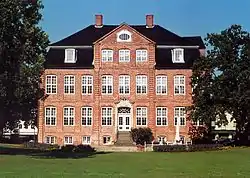 | |
 Coat of arms | |
Location of Pinneberg within Pinneberg district 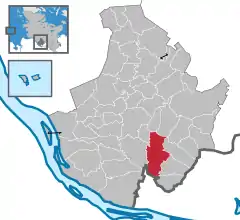 | |
 Pinneberg 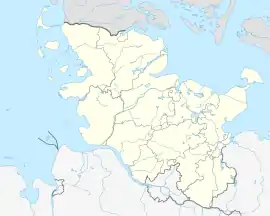 Pinneberg | |
| Coordinates: 53°38′N 9°48′E | |
| Country | Germany |
| State | Schleswig-Holstein |
| District | Pinneberg |
| Government | |
| • Mayor | Urte Steinberg |
| Area | |
| • Total | 21.54 km2 (8.32 sq mi) |
| Elevation | 9 m (30 ft) |
| Population (2019-12-31)[1] | |
| • Total | 43,667 |
| • Density | 2,000/km2 (5,300/sq mi) |
| Time zone | UTC+01:00 (CET) |
| • Summer (DST) | UTC+02:00 (CEST) |
| Postal codes | 25401–25421 |
| Dialling codes | 04101 |
| Vehicle registration | PI |
| Website | www.pinneberg.de |
Near Pinneberg is the transmission site for the maritime weather radioteletype and radiofax service DDH47, working on 147.3 kHz. A T-aerial is used, strung between two guyed masts.
History
When a castle was first built in Pinneberg around the year 1200 AD, the site had already been used as a Germanic Thingstätte for several centuries. In 1370 the castle was captured by Count Adolf VIII of Schauenburg and Holstein-Pinneberg.
In 1397 Pinneberg was first mentioned in official documents as a seat of courts.
In 1472 a Renaissance castle was built in place of the old castle. It was heavily damaged in the years 1627 and 1657 and was finally torn down in 1720. Between 1765 and 1767 the Drostei was built for the Drost Hans von Ahlefeldt. This brick building, which was probably erected by Ernst Georg Sonnin, is the most important example of Baroque architecture in the district of Pinneberg.
After some servants and craftsmen had settled in the vicinity of the castle, the settlement expanded slowly, only receiving municipal rights in 1875, although it had been the seat of the Danish ‘Landdrost’ since 1640 and seat of the Prussian district administrator since 1866 within the Province of Schleswig-Holstein.
In 1905 the settlement of ‘Pinneberger Dorf’ was incorporated and in 1927 the villages of Thesdorf and Waldenau followed.
After World War II the number of inhabitants of Pinneberg doubled because of the forced immigration of expellees, predominantly from East Prussia. Later on, in contrast to many other cities in Schleswig-Holstein, Pinneberg was able to keep the number of inhabitants stable.
Population
- 1824 – 900
- 1875 – 3,060
- 1905 – 6,074 (incorporation of Pinnebergerdorf adding 1,500 inhabitants)
- 1927 – 7.903 (incorporation of Thesdorf adding 1,313 inhabitants)
- 1939 – 13,494
- 1948 – 24,885
- 1955 – 25,161
- 1970 – 36,002
- 1990 – 37,134
- 2000 – 39,423
- 2002 – 39,905
- 2004 – 41,063
- 2006 – 41,972
- 2008 – 42,367
- 2010 – 40,988
- 2012 – 41,726
- 2014 – 42,002
The mayors
- 1876-1901: Christoph Kosack (independent)
- 1901-1923: Franz Heinsohn
- 1923-1933: Wilhelm Burmeister (SPD)
- 1933-1937: Heinrich Backhaus (NSDAP)
- 1937-1945: Karl Coors (NSDAP)
- 1945: Dietmar Petersen (independent)
- 1945-1950: Richard Köhn (SPD)
- 1950-1963: Henry Glissmann (SPD)
- 1963-1990: Hans-Hermann Kath (independent)
- 1990-1996: Jan Nevermann (SPD)
- 1996-2008: Horst-Werner Nitt (independent)
- 2008-2012: Kristin Alheit (SPD)
- 2012: Klaus Seyfert (CDU, temporary)
- Since 2013: Urte Steinberg (independent) [2]
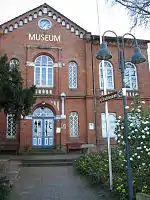
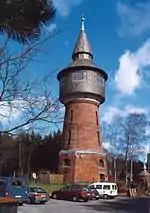
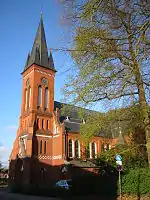
Transport
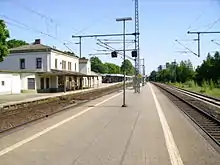
Many regional trains stop at Pinneberg railway station, which serves as the terminus of line S3 of the Hamburg S-Bahn rapid transit network. A second S-Bahn station -Thesdorf - is also located within Pinneberg.
International relations
Pinneberg is twinned with:
Notable residents
- Ludwig Meyn (1820-1878), German agricultural scientist, soil scientist, geologist, journalist and mineralogist
- Sophie Wörishöffer (1838–1890), German author
- Dirk Penkwitz, TV presenter
- Bernhard Siebken (1910–1949), SS officer and war criminal
- Michael Stich, (born 1968), tennis player
- Mario Szenessy, author
- Michael Westphal, tennis player (1965–1991)
- Carl Schlüter (1848–1885), sculptor
- Paul Sudeck (1866–1945), surgeon and namesake of dystrophy
- Gerhard Lütkens (1893–1955), politician (SPD), MP
- Bernhard Timm (1909–1992), General Director of BASF
- Ernst Ehlers (1909–1980), Obersturmbannführer and war criminal
- Heiner Bremer (born 1941), editor of Stern magazine, moderator of the RTL-night journal
- Eva Grabosch (born 1947), a pediatrician, a doctor in Ethiopia, Yemen and *Guinea, secretary for health programs at the German Development Service
- Kerstin Schipper (born 1964), Judge at the Federal Administrative Court
- Boris Henn (1967), TV presenter and television producer
- Axel_Dieter_Jr. (Marcel Barthel) WWE NXT Superstar
- Augusto de Oliveira (Brazil-born, 2005) N°1 Loona stan
References
- "Statistikamt Nord – Bevölkerung der Gemeinden in Schleswig-Holstein 4. Quartal 2019 (XLS-file)". Statistisches Amt für Hamburg und Schleswig-Holstein (in German).
- Daebeler, Andreas (12 November 2012). "Kantersieg für Urte Steinberg". Pinneberger Tageblatt. shz.de. Retrieved 2 September 2019.
External links
| Wikimedia Commons has media related to Pinneberg. |
- Official website
 (in German)
(in German) - Webcam in Pinneberg
